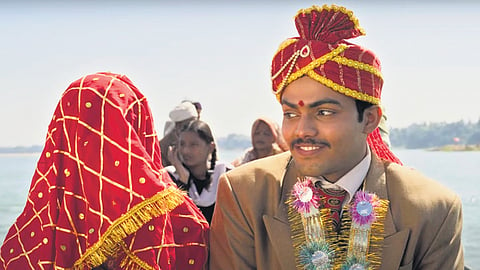

Technically speaking, Kiran Rao does not have much to her claim. With her new project, Laapata Ladies, she has all of two films as director. But her debut, Dhobi Ghaat, released in 2012, had enough impact for her to have recall value over a decade later. It is safe to say that audiences wanted to see what she had in store for them next. That was pretty much her goal while writing and directing Laapata Ladies—the yearning. “The real success of any story is when you want to know what is going to happen next; it keeps you guessing and interested,” says Rao.
The film is an adaptation of Biplab Goswami’s prize-winning screenplay, Two Brides. It revolves around two newly-wed women who get separated from their respective families during a train journey, and what ensues when a police officer probes the case. Over the next few days, as everybody goes berserk looking for the women, one bride discovers a different world while the other challenges the patriarchy around her.
This is, however, not just a social film, says Rao. It is a compulsive comedy that finds humour in the most serious situations. “The original story was wonderful, but I felt the entertainment quotient could be higher. Besides, I wanted to develop the character of the girls differently to bring in suspense and intrigue. But humour was a priority.
I think it is a great vehicle to say anything because it tends to soften a person and opens up your mind as you are having a good time,” the filmmaker says.
That Rao is a meticulous professional is evident from the pace of her choices. She has taken her time to make her second film, as she has to produce projects in the last two decades. Between 2008 and 2022, she has bankrolled only nine projects, most of which star her former husband, actor Aamir Khan.
Laapata Ladies only vindicates her penchant for perfection. “I had taken a big break as a director, so I was a little nervous before I started shooting. But I knew the story well, and had worked a lot to develop the script. It was a bit like cycling where it is difficult in the beginning to regain your balance, but your brain remembers. My initial fears were soon overtaken with excitement and I had the confidence I could do it,” says Rao, who adds that no decision about the film was random. For instance, it is set in 2001, and she explains why. “I wanted to make it believable that two girls could go missing for days and no one has any idea where they are. It won’t be possible now in this day of internet and technology,” she says, adding, “Then, I wanted to explore what happens when a girl is allowed to fulfill her dreams, or allowed to go beyond the prescribed limits set on a girl’s imagination or potential. If you are optimistic this could actually happen. I wanted to make it progressive and uplifting.”
The element of journey in Goswami’s story helped Rao bring her own visions to life. “It let me to explore many ideas along the course of the journey; like being lost is not such a bad thing,” she says, adding, “While the story is set in a village (rural Madhya Pradesh and Maharashtra), it has universal issues at its core.”
The 50-year-old filmmaker and producer understands that she has stepped back into filmmaking at a time when people have access to all kinds of stories and in multiple formats. But she doesn’t remember being unsure of Laapata Ladies, which premiered at the Toronto International Film Festival last year, ever. “Yes, it is harder today to make something that cuts through all the clutter and immediately attracts people. But we are also being pushed to produce better work,” she says, adding, “I felt this story had the makings of that because it is juicy and chatpata (spicy). The fact is when a story—irrespective of the language, length or format—has the power to make you curious, it becomes easier for the storyteller.”
Federico Fellini, Andrei Tarkovsky and Wong-Kar Lai are some of the filmmakers Rao has been influenced by, but off-late, she admits to have fallen victim to the K-drama frenzy. “There is a whole variety of genres they make, and there is a lot to learn from their storytelling. I am not good with horror and gore, but I love romance, and hope to make a fantastic romantic film someday,” she says. But, that could be a decade-long wait.